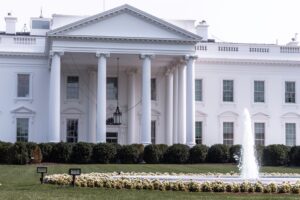Photo: C-SPAN [Public domain]
By Jeff Rasley
Several months ago, Congress and the American public aligned along predictable battle lines in the battle over funding for President Trump’s wall and ending the government shutdown. Before the newly-elected members of Congress were even sworn in after the 2018 mid-term elections, the fight over who to blame over the shutdown confirmed that hard-line partisanship would remain the norm in Congress. President Trump and Speaker Pelosi expected obedience along party lines, and they got it. Any hope that the slew of new congressional representatives might end ten years of toxic partisan polarization was dashed.
Or was it?
While the media focused its primary attention on the fights over the wall and over responsibility and blame for the shutdown, something different was going on in the U.S. Senate. The hearings on William Barr’s confirmation for U.S. Attorney General were conducted with the mature civility one would expect from a deliberative body of responsible adults. The Senate’s final vote did end up reflecting the expected partisan divide, of course—but the tone and behavior of the Senators during questioning sessions was totally different from that displayed during the Kavanaugh hearings a few months before.
Why didn’t the Barr hearings play out like the Kavanaugh partisan slugfest? Barr is a Trump supporter and a major Republican insider, and was critical of the Mueller investigation. He sent a legal opinion to the Justice Department in June arguing that Trump’s executive authority trumped Mueller’s right to interrogate the President about possible obstruction of justice. Surely some Senate Democrats’ claws were sharpened to attack Bill Barr with the same venomous enthusiasm unleashed on Brett Kavanaugh.
But that didn’t happen. The most dramatic moment of the hearings was the opening question by Judiciary Committee Chair Lindsey Graham. Does Barr think Mueller would engage in a “witch hunt?” Barr answered that he does not.
Barr’s demeanor was grave and respectful throughout the long hours of questioning by senators. The Senate inquisitors were equally grave and respectful toward Barr. During his interrogation Barr sat placidly and responded with appropriate gravitas to questions about his qualifications and legal opinions.
During the Kavanaugh hearings, Senator Cory Booker had accused Republicans of being “complicit in evil.” And then, the New Jersey senator dramatically walked out on the hearing, declaring it a “dark moment” in history. But in the Barr hearings, Booker engaged in friendly colloquy with Barr about policing of African-American neighborhoods.
Remember Democratic Senator Amy Klobuchar’s emotionally wrought confrontation of Judge Kavanaugh, about his beer drinking? Kavanaugh angrily demanded that Klobuchar answer the same questions about her drinking. But in the Barr hearings, Senator Klobuchar questioned Barr on the hot-button topics of the government shutdown and Trump’s wall. Voices were not raised and there was no fist pounding.
Again during the Kavanaugh hearings, Senator Diane Feinstein’s release of the bombshell letter from Dr. Christine Blasey Ford, accusing Judge Kavanaugh of attempted rape, ratcheted up partisan passions. But when the senior Democratic senator asked Barr about whether he would protect the integrity of the Mueller investigation, Barr answered “Absolutely!” as Senator Feinstein smiled appreciatively.
Who can forget the image of Senator Lindsey Graham’s face contorted with rage while he screamed at the camera, accusing Senator Feinstein of withholding and then surprising the Committee with Dr. Ford’s letter, and of attempting to sabotage Kavanaugh’s confirmation? There was a sea change in the Senate from shrieks of outrage and walk-outs during the September 2018 Kavanaugh hearing to the civil tone of the February 2019 Barr hearing. Perhaps senators saw a message in the mixed results of the 2018 mid-term elections, a message that the media has failed to notice – that voters are sick and tired of the vitriolic partisanship we witnessed in the Kavanaugh hearings.
The furious partisan-polarization of the 2016 Clinton/Trump campaigns left me wondering whether the body politic could recover. I wanted to do something to try to help us heal.
A month after the inauguration of President Trump, I invited Facebook friends to participate in a series of discussion threads about political topics. 63 “friends” initially agreed. They included people who were pro- and anti-Trump, blue- and white- collar, Baby Boomers and Millennials, high school grads and PhDs, and urban and rural dwellers, people from multiple states. Topics ranged from immigration reform, U.S. policy in Syria, relations with Russia, collusion between the Trump campaign and Russia, the Paris Climate Accord, and even abortion.
The only rule laid down was that no personal attacks would be allowed by participants against each other. I encouraged everyone to use facts and reason to support their arguments. Nasty remarks about Trump, Clinton, and other politicians were posted. The divisions over issues tended to mirror the pro- and anti-Trump sentiments of the commenters. But they did abide by the no ad-hominem attacks rule.
I planned to post issues each week for two months and then terminate the experiment. But a number of the participants wanted to continue the discussions, so we continued the weekly discussions for another month. The number of participants reached 80 during the three months of discussion threads.
This experiment showed that a representative sample of Americans want to breach the partisan divide to engage in civil discourse about important political issues. Despite the fragmentation of cable news channels and the polarizing behavior of the President and Congressional leaders, I think there is growing grassroots impatience with entrenched and ugly partisan politics.
The lesson of the Kavanaugh hearings should be that, despite ideological differences and the short-term success of polarizing tactics, no one wins the long game when our elected representative act like angry children. The civil tone of the Barr hearings offers hope that the Senate may be ready to reclaim its title as “the world’s greatest deliberative body.”
Imagine the progress we can make on any number of issues, if our leaders engage in thoughtful deliberation and use facts and reason to make policy. If politicians behave like adults, cease childish tweeting, name-calling, and posturing, we might even avoid another government shut down.
Jeff Rasley is a retired lawyer and the author of Polarized! The Case for Civility in the Time of Trump. He resides in Indianapolis, Indiana.

![C-SPAN [Public domain]](https://braverangels.org/wp-content/uploads/2019/04/William_Pelham_Barr.png)



1 thought on “Flashback: Surprising Civility in the U.S. Senate’s Barr Confirmation Hearings”
I want to learn more about this organization and will spend some time exploring your website. I enjoyed the analysis of the difference in tone of the Kavanaugh hearings and the Barr confirmation. I wish this same analysis would be done between Barr’s hearings and his appearance before Congress regarding the Mueller report. It seems whatever civility had taken hold for a brief moment has been blown away by another storm.